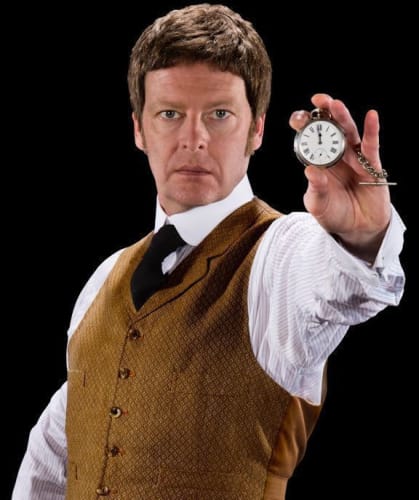Time travel is an emotive subject that’s omnipresent in the tiny, exquisitely beautiful Georgian Theatre in Richmond, North Yorkshire. Small and precious, it is, after all, a time capsule in its own right which transports us back to another century. Could be then that it’s the perfect place for a bit of time travelling, or ‘transcendental navigation’, as H G Wells would have phrased it.
Forget the big-budget blockbuster adaptations like The Invisible Man, War of The Worlds, Star Wars and the television spin-offs like Dr Who. Elton Townend Jones, the writer and director of this one-man production of The Time Machine, is clearly inspired by the original science fiction novella of the same name, written by Wells and published in 1895.
Here, on an almost bare stage, the backdrop and floor are covered with a beige burlap-type material and a relatively small, two-tiered wooden plinth sits upstage. There are virtually no props save a pair of out-of-place modern white trainers. I imagine they were there as a symbol of travel but they were parked upstage left where I couldn’t actually see them for most of the production—they may have even walked on and off on their own, who knows?
I’m afraid I need to have a bit of a rant at this point; not necessarily aimed at this production in particular, but a trend that this extreme minimalist style accentuates: pushing back the sight lines. Why place the main action as far back on stage as is humanly possible when you barely use the front metre of stage? And, in this particular theatre, with audience on three sides of a square and where intimacy is a key factor, staging the main action up-stage means that a lot of us just can’t see a lot of what’s going on. It’s not rocket science (sorry!), it’s just simple geometry and thoughtful recognition that every theatre has different sight-lines. Come forward, we want to see you, it’s why we bought our tickets.
Rant over.
Danny Bright’s sound design is decent enough and Martin Tucker’s lighting is more than competent, adding the much-needed colour—although there is a tendency to toward the extreme from both disciplines. A good deal of the performance is done in semi-darkness and a little light on our Time Traveller would have helped and a few of the sound effects are so literal you could put mustard on them.
Everything begins in the half-light with much wailing, screaming, belly-clutching and retching that every parent who’s ever experienced a five-year-old with car sickness would recognise. Stephen Cunningham has a kind of super-human energy that’s on the same velocity scale as a hurricane and boy, is he in charge of those amazing words! A bit loud though, as testified by one member of the audience who left after ten minutes complaining that it was "too loud".
Cunningham is without doubt a skilled actor; he does, however, have a slight tendency to babble and he also talks through his teeth from time to time. That aside, he chucks everything he’s got at the portrayal of the time traveller and he must be admired for that. The trouble is that ‘everything’ is too much some of the time and, with 90 minutes of such rapid-fire dialogue, I felt word-bruised, as if I was personally under attack.
The storyline is a well-written, perfect adaptation of the original; no complaints there. Elton Townend Jones has plundered the very essence of Wells’s imagined future, projecting a life where the human intellect has committed suicide and split into two species. Life in AD802701 London for instance is eerily populated by a society of ‘little, brittle’ (love the assonance) elegant, childlike adults, the Eloi. Later in the dark, he’s approached by the menacing underground light-fearing creatures, the Morlocks, who have stolen his time machine, which incidentally is a tiny pocket watch and not some grand concoction with wires and clocks and tubes.
Of course, all this is all done through the medium of storytelling with great skill in an animated-narrator style (if there is such a thing) but apart from the odd flashes of brilliant lighting, and a bit of rudimentary shadowplay, it appears more suited to the medium of a radio play, albeit a damn good one.
The staging’s simplicity doesn’t lend itself to groundbreaking theatre and it left me feeling I was missing a dimension or three. I think I would have got much more from it sat in my armchair at home with my eyes closed, a glass of wine in my hand, and maybe then I wouldn’t have had to worry about those trainers and whether they were relevant, symbolic, or whether they were even physically there.
